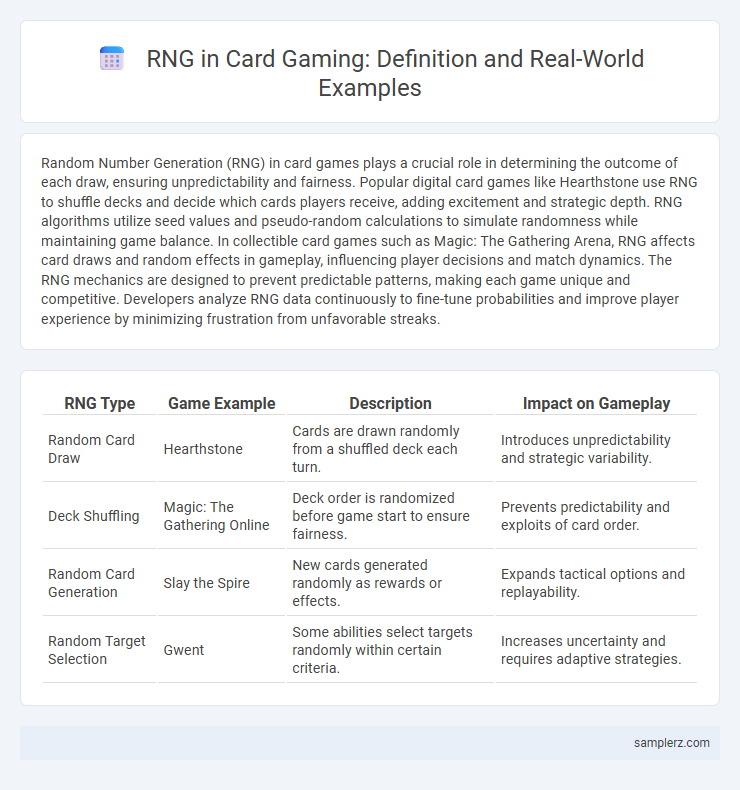Random Number Generation (RNG) in card games plays a crucial role in determining the outcome of each draw, ensuring unpredictability and fairness. Popular digital card games like Hearthstone use RNG to shuffle decks and decide which cards players receive, adding excitement and strategic depth. RNG algorithms utilize seed values and pseudo-random calculations to simulate randomness while maintaining game balance. In collectible card games such as Magic: The Gathering Arena, RNG affects card draws and random effects in gameplay, influencing player decisions and match dynamics. The RNG mechanics are designed to prevent predictable patterns, making each game unique and competitive. Developers analyze RNG data continuously to fine-tune probabilities and improve player experience by minimizing frustration from unfavorable streaks.
Table of Comparison
| RNG Type | Game Example | Description | Impact on Gameplay |
|---|---|---|---|
| Random Card Draw | Hearthstone | Cards are drawn randomly from a shuffled deck each turn. | Introduces unpredictability and strategic variability. |
| Deck Shuffling | Magic: The Gathering Online | Deck order is randomized before game start to ensure fairness. | Prevents predictability and exploits of card order. |
| Random Card Generation | Slay the Spire | New cards generated randomly as rewards or effects. | Expands tactical options and replayability. |
| Random Target Selection | Gwent | Some abilities select targets randomly within certain criteria. | Increases uncertainty and requires adaptive strategies. |
Understanding RNG in Card Games
Random Number Generation (RNG) in card games determines the order and distribution of cards, ensuring unpredictability and fairness during gameplay. The algorithm simulates randomness to shuffle decks, draw cards, and influence outcomes without bias. Understanding RNG helps players grasp the role of chance versus strategy in games like Magic: The Gathering or Hearthstone.
Popular Card Games Utilizing RNG
Popular card games like Hearthstone and Magic: The Gathering utilize RNG (Random Number Generation) to introduce unpredictability in card draws and effects, enhancing strategic depth and replayability. RNG determines the order of shuffled decks and random damage or buffs, ensuring each match varies significantly. This mechanic challenges players to adapt their strategies dynamically, making gameplay engaging and competitive.
How RNG Influences Draw Mechanics
Random Number Generation (RNG) in card games determines the unpredictability of the draw mechanics, directly impacting game strategy and player experience. RNG algorithms control which cards appear from the deck, ensuring each draw is independent and statistically random, thus maintaining fairness and excitement. This randomness influences deck-building decisions and in-game tactics, as players must adapt to uncertain card availability during matches.
Shuffling Algorithms and RNG Impact
Shuffling algorithms in card games rely on pseudorandom number generators (RNG) to ensure unpredictable outcomes and fair play, directly affecting the randomness of card distribution. Commonly used algorithms such as the Fisher-Yates shuffle use RNG to produce unbiased permutations of the deck, minimizing pattern predictability. The quality of the RNG impacts player experience by influencing game fairness, strategy development, and replayability through consistently varied game states.
Deck-Building and RNG Variability
Random Number Generation (RNG) in deck-building games introduces variability by shuffling cards to create unpredictable draws, ensuring no two matches play out identically. This element of chance affects strategic decisions, as players must anticipate potential card combinations and manage risk based on probabilistic outcomes. Effective deck construction balances high-impact cards with versatile options to mitigate RNG's influence while maximizing synergy.
RNG in Digital vs. Physical Card Games
Random Number Generation (RNG) in digital card games like Hearthstone ensures card draws and effects are unpredictable through algorithms, providing consistent randomness without human bias. In contrast, RNG in physical card games such as Magic: The Gathering relies on shuffling and manual draws, which can introduce human error and subtle biases. Digital RNG offers precise probability control and smooth gameplay, while physical RNG emphasizes tactile interaction and player skill in shuffling techniques.
RNG Effects on Game Balance
Random Number Generation (RNG) in card games introduces unpredictability in card draws and effects, significantly impacting game balance by creating a dynamic range of possible outcomes. RNG can lead to both advantageous and disadvantageous scenarios for players, sometimes enhancing strategic depth but other times causing frustration due to perceived unfairness. Effective game design carefully calibrates RNG elements to maintain competitive fairness while preserving excitement and replayability.
Player Strategies for RNG Mitigation
Players mitigate RNG in card games by employing deck-building strategies that maximize consistency, such as including draw engines and card filtering mechanics to reduce reliance on luck. Understanding probability distributions allows players to make informed decisions about risk versus reward, optimizing plays based on the likelihood of drawing specific cards. Adopting adaptive mulligan strategies further enhances control over starting hands, increasing the chances of favorable outcomes despite inherent randomness.
Notable Moments of RNG in Esports Card Games
Notable moments of RNG in esports card games include the famous "Topdeck" from the 2018 Hearthstone World Championship where Firebat drew the exact card needed to win in the final turn. In Magic: The Gathering Arena, the 2021 Mythic Invitational featured an intense match where a random coin flip determined the outcome, showcasing RNG's impact on strategy. These moments exemplify how RNG elements create dramatic, unpredictable shifts in competitive card gaming.
Future Trends: RNG in Next-Gen Card Gaming
Next-gen card gaming integrates advanced RNG algorithms to enhance unpredictability and fairness, leveraging machine learning to create dynamic deck compositions tailored to player behavior. Blockchain technology is increasingly used for transparent RNG validation, ensuring provably fair card distribution and boosting player trust. Real-time data analytics combined with RNG enables adaptive game mechanics, evolving card rarity and abilities based on in-game events and player interactions.

example of RNG in card Infographic
 samplerz.com
samplerz.com